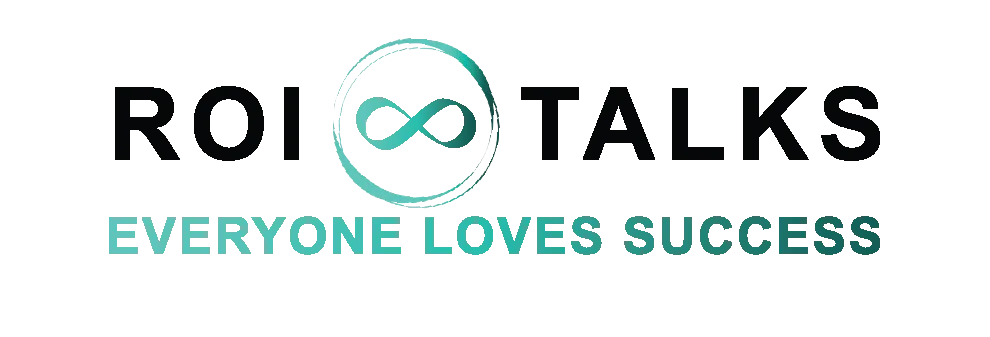Everyone Loves Success
ROI TALKS
Roi Talks Blog

How to Use the IKO Principles to Ace Your Next Job Interview?
An interview can be a nerve-wracking experience, but by using the IKO Principles, you can approach it with confidence and preparedness. The IKO Principles - Inner Self, Knowledge, and Outer Self - are a set of guidelines that outline the steps you can take to become a great presenter/speaker/orator. By applying these principles to an interview situation, you can increase your chances of success in securing the job.
Inner Self
The Inner Self stage of the IKO Principles is focused on managing your mindset and emotions. It's natural to feel nervous before an interview and by practising wholesome self-talk, visualization, and managing your emotions, you can approach the interview with confidence.
One technique for managing your mindset and emotions is to practice wholesome self-talk. According to a study published in the Journal of Occupational Health Psychology, wholesome self-talk can boost performance and reduce stress in high-pressure situations such as job interviews. Before the interview, remind yourself of your skills and experience, and focus on the wholesome aspects of the interview. For example, instead of telling yourself "I'm not good enough for this job," say "I have the skills and experience needed for this role."
Visualization is another powerful technique for managing your mindset and emotions. According to a study published in the Journal of Imagery Research in Sport and Physical Activity, visualization can improve performance and reduce anxiety in high-pressure situations. Visualize yourself giving a successful interview and imagine yourself answering questions confidently and succinctly. This can help you feel more confident and prepared for the interview.
Managing your emotions is also important for acing an interview. It's normal to feel nervous before an interview. If your nerves get the best of you, it can affect your performance. To manage your emotions, use techniques such as breathing exercises or mindfulness to stay calm during the interview. This will help you think more clearly and present yourself in a professional and positive manner.
Knowledge
The Knowledge stage of the IKO Principles is focused on organizing your content and practising your delivery. To prepare for an interview, it's important to research the company and the role and to organize your content into a clear and concise structure. Before the interview, define your objective and identify the key skills and experiences you want to highlight. This will help you stay focused during the interview and ensure that you highlight your most relevant experiences and skills.
Research the company and the role you are interviewing for. This will help you understand the company culture, the role requirements, and the values the company holds. According to a survey by Glassdoor, 88% of job seekers agree that understanding a company's culture is important before applying for a job.
Organize your content into a clear and concise structure. According to a study published in the Journal of Business Communication, interviewees who structure their responses in a clear and concise manner are perceived as more competent and confident. Prepare examples and stories that demonstrate your skills and experiences and that are relevant to the company and the role.
Practice your delivery to refine your responses. Time yourself to ensure that your answers are concise and to the point. Use specific and detailed examples of your skills and experiences, as interviewees who provide specific and detailed examples are perceived as more competent and more likely to be hired according to a study published in the Journal of Applied Psychology.
Outer Self
The Outer Self stage of the IKO Principles is focused on using effective body language, clear language, and interactive activities to connect with your audience. To ace your next job interview, it's important to use effective body language, clear language, and interactive activities to engage with the interviewer.
Use effective body language to convey confidence. Make eye contact where appropriate (this is not a staring match), use appropriate gestures, and vary your tone and pitch to keep the interviewer engaged. According to a study published in the Journal of Nonverbal Behavior, interviewees who use effective nonverbal communication such as eye contact, smiling, and appropriate gestures are perceived as more competent and likeable.
Use clear and concise language to ensure that the interviewer can understand your responses. Avoid using jargon or technical terms that the interviewer may not be familiar with. Use language that is easy to understand, and try to explain complex concepts in simple terms.
Engage the interviewer by asking relevant questions about the company and the role. This shows that you are genuinely interested in the position and helps you build rapport with the interviewer. According to a survey by Glassdoor, 82% of job seekers believe that asking questions during an interview is important to make sure the job is right for them.
Final Note
Another way to engage the interviewer is to use interactive activities such as role-playing or problem-solving exercises. This can help you demonstrate your skills and experience in a practical and engaging way. According to a study published in the Journal of Educational Psychology, interactive activities can increase engagement and improve learning outcomes.
In addition to the IKO Principles, there are several other techniques you can use to ace your next job interview. Here are a few additional tips:
Dress Appropriately: Your appearance can make a big impression on the interviewer, so make sure you dress appropriately for the interview. Dress professionally and make sure your clothes are clean and pressed.
Arrive Early: Arriving early to the interview shows that you are punctual and respectful of the interviewer's time. Plan to arrive at least 10-15 minutes early to allow for any unforeseen delays.
Follow-Up After the Interview: After the interview, follow up with a thank-you email or note. This shows that you are interested in the position and helps you stand out from other candidates.
By applying the IKO Principles and other techniques to an interview situation, you can approach it with confidence and preparedness, and increase your chances of success in securing the job. Remember to practice wholesome self-talk, and visualization, and manage your emotions. Research the company and the role, and organize your content into a clear and concise structure. Use effective body language, clear language, and interactive activities to engage with the interviewer. Remember to dress appropriately, arrive early, and follow up after the interview. With these techniques in mind, you can ace your next job interview and take the next step in your career.
ROI TALKS™
Marina Plaza - Office 1004 -1006
Dubai Marina, Dubai, UAE





